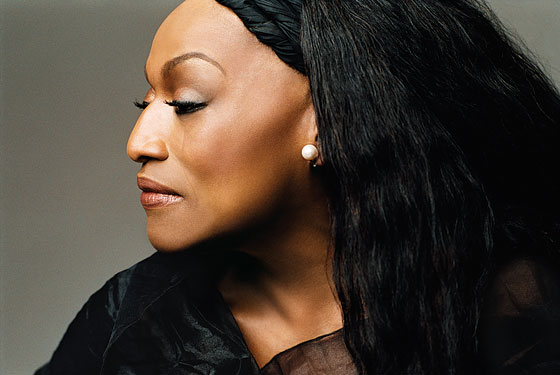
In the first days of Honor!— Carnegie Hall’s three-week festival of African-American culture—the robed and turbaned soprano Jessye Norman stood near the altar of the Cathedral Church of St. John the Divine and, with priestly pomp, flung the gilded phrases of Duke Ellington’s sacred music toward the echoing nave. Ellington and God were the evening’s ostensible honorees, their glory magnified by an impressive cast of jazz musicians, choristers, dancers, and string players. But this was Norman’s night and Norman’s festival, and she was not about to let anyone forget it. When a diva says Honor!, it’s followed by a silent “me.”
When the administrators at Carnegie Hall were casting about for a point of view on African-American music, Norman answered the call with an extravaganza focusing on pride and precedent: the forebears who helped her ascend to the status of monument and the heritage she passes on to others. But in reciting that series of begats, she is also rehearsing a much too confining narrative. The election of Barack Obama demonstrated that black politics aren’t separate from the rest of civic life. Norman’s festival barely acknowledges that a similar fusion occurred long ago in music, that black traditions have woven themselves into the world’s sounds, from Parisian cakewalks to hip-hop in Bangkok. Thelonious Monk’s cubist rhythms, John Coltrane’s controlled ecstasies, and Ornette Coleman’s exuberant clangor have energized composers everywhere. It’s become impossible to distinguish the color of influence. James Brown beats intertwine with Stravinskian hammer strokes, hip-hop vocalism fuses with Schoenberg-style speech-song, and American operatic declamation is soaked in gospel lyricism. Black music is modern music, and the other way around.
By draping so much programming around Norman’s broad shoulders, Carnegie has missed a chance to trace the intricate pathways by which African-American music penetrated the modern sensibility. Instead, the institution has fashioned an old-school sort of tribute, emphasizing one people’s separate history as if black America existed in a cultural ecology of its own.
The festival does offer a few classical works that invoke black genres for their sociological associations. In one upcoming concert, the Philadelphia Orchestra will perform Darius Milhaud’s 1923 La Creation du Monde, which sets an African creation myth to a jazz fugue, conflating continents for the purpose of exotic titillation. Another event features the British composer Michael Tippett’s A Child of Our Time—an oratorio steeped in the English choral tradition and shot through with spirituals.
But the links are older, deeper, and more structural than that. The white Creole pianist and composer Louis Moreau Gottschalk, born in New Orleans in 1829, began his education by watching slaves drumming and dancing in Congo Square. Later, he carried a sophisticated understanding of Afro-Caribbean music to France, where he was treated as a colorful celebrity. Gottschalk’s disarming influence could still be felt in the early twentieth century, in Debussy’s ragtime piano pieces and the jazzy effusions of Ravel. It wasn’t just the heat and playful dance rhythms that attracted these avatars of the modern sensibility; it was the tension between spontaneous utterance and rigid framework underlying call-and-response forms, from field songs to swing and R&B.
European modernists didn’t just admire jazz musicians; they envied them. In the thirties, the architect Le Corbusier, who had been literally exposed to black culture via an affair with Josephine Baker, proclaimed his reverence for Louis Armstrong. In jazz he found “the soul’s melody joined to the machine’s rhythm”—the very synthesis of the romantic and the industrial that he aspired to in his designs. We still live in Le Corbusier’s—and Armstrong’s—world, seeking equilibrium between the ecstatic solo and life’s reassuring chain of downbeats.
The irony of Jessye Norman taking a crimped view of her own cultural background is that she belongs to a chain of black women who sang European music at Carnegie Hall as if it had been encoded in their DNA. The soprano Sissieretta Jones appeared in the hall’s 1892 season, singing Gounod and Verdi. Marian Anderson made her Carnegie Hall debut in 1928—almost three decades before the Metropolitan Opera would have her. As for Norman, when that rich-soil voice was in its prime, millions wanted to hear it sing Wagner and Strauss. The African-American cultural legacy embraces Isolde’s “Liebestod,” too.
Honor!
Curated by Jessye Norman.
Carnegie Hall. Through March 23.
